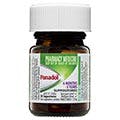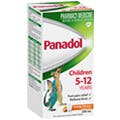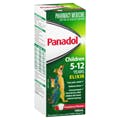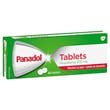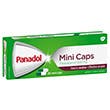

Colourfree Baby Drops 1-2 Months

Colourfree Suspension 1-5 Years

Chewable Tablets 3+

Suppositories 6 Months - 5 Years

Colourfree Suspension 5-12 Years

Elixir 5 - 12 Years

Suppositories 5-12 Years

Soluble 7+

Panadol Tablets

Panadol Caplets with Optizorb Formulation

Panadol Tablets with Optizorb Formulation

Panadol Gel Caps

Panadol Mini Caps

Panadol Suppositories

Panadol Back & Neck

Panadol Extra Caplets

Panadol Rapid Soluble

Panadol Rapid Caplets

Panado Rapid Handipak

Panadol Back & Neck Long Lasting

Panadol Osteo

Panadol Cold & Flu + Decongestant

Panadol Cold & Flu - Flu Strength (Day & Night)

Panadol Cold & Flu Relief + Cough

Panadol Cold & Flu MAX Hot Lemon
Compare Now (0/5)
- Product
- Format
- Age
- Key Features
- Ingredients

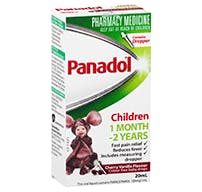
Colourfree Baby Drops 1-2 Months
- Concentrated Drops
- 1 Month - 2 Years
- Gentle on Tiny Tummies
- 500mg Paracetamol
- No gluten, lactose or sugar

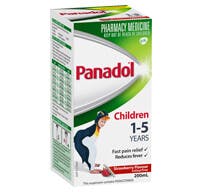
Colourfree Suspension 1-5 Years
- Suspension
- 1-5 Years
- Strawberry/Orange Flavour
- Active Ingredient: Paracetamol 24 mg/mL


Chewable Tablets 3+
- Dissolvable Tablets
- 1-5 Years
- Perfect For Travel
- Active Ingredient: 120mg of Paracetamol per tablet

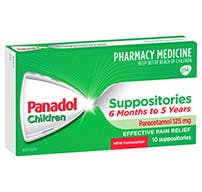
Suppositories 6 Months - 5 Years
- Suppositories
- 6 Months - 5 Years
- For vomiting
- Active ingredient: Paracetamol 125mg per suppository.


Colourfree Suspension 5-12 Years
- Suspension
- 5-12 Years
- Strawberry/Orange Flavour
- Active ingredient: Paracetamol 48 mg/mL

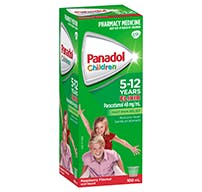
Elixir 5 - 12 Years
- Suspension
- 5-12 Years
- Fast & gentle relief
- Active ingredient: Paracetamol 48 mg/mL

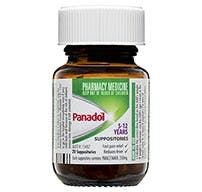
Suppositories 5-12 Years
- Suppositories
- 5-12 Years
- For vomiting
- Active ingredient: 250mg Paracetamol per suppository


Soluble 7+
- Effervescent Tablets
- 7+ Years
- Absorbed quicker
- Active ingredient: Paracetamol


Panadol Tablets
- Tablets
- 12+ Years
- Basic Pain
- Active ingredient: 500mg Paracetamol


Panadol Caplets with Optizorb Formulation
- Caplets
- 12+ Years
- Quicker Absorbtion
- Active ingredient: 500mg Paracetamol


Panadol Tablets with Optizorb Formulation
- Tablets
- 12+ Years
- Quicker Absorbtion
- Active ingredient: 500mg Paracetamol


Panadol Gel Caps
- Caplets
- 12+ Years
- Easier to swallow
- Active ingredient: 500mg Paracetamol

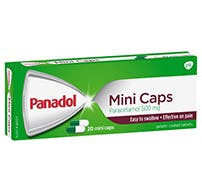
Panadol Mini Caps
- Caplets
- 12+ Years
- Easier to swallow
- Active ingredient: 500mg Paracetamol


Panadol Suppositories
- Suppositories
- 12+ Years
- For vomiting
- Active ingredient: 500mg Paracetamol per suppository.

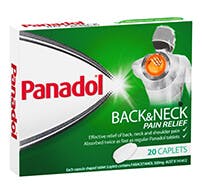
Panadol Back & Neck
- Caplets
- 12+ Years
- Fights Back Pain
- Active ingredient: 500mg Paracetamol


Panadol Extra Caplets
- Caplets
- 12+ Years
- Fight Tough Pai
- Active ingredient: 500mg Paracetamol , 65mg caffeine


Panadol Rapid Soluble
- Dissolvable Tablets
- 12+ Years
- Absorbed 2x Faster
- Active ingredient: 500mg Paracetamol


Panadol Rapid Caplets
- Caplets
- 12+ Years
- Absorbed 2x Faster
- Active ingredient: Paracetamol


Panado Rapid Handipak
- Caplets
- 12+ Years
- Absorbed 2x Faster
- Active ingredient: 500mg Paracetamol


Panadol Back & Neck Long Lasting
- Caplets
- 12+ Years
- Up to 8 hours
- Active ingredient: 655mg Paracetamol


Panadol Osteo
- Tablets
- 12+ Years
- Up to 8 hours
- Active ingredient: 665mg Paracetamol


Panadol Cold & Flu + Decongestant
- Caplets
- 12+ Years
- With Decongestant
- 500mg Paracetamol


Panadol Cold & Flu - Flu Strength (Day & Night)
- Caplets
- 12+ Years
- Day & Night Relief
- 500mg Paracetamol


Panadol Cold & Flu Relief + Cough
- Caplets
- 12+ Years
- Cough Relief
- 500mg Paracetamol
Minimise
For New Dads
Being present at the delivery of your baby is a wonderful event and the beginning of a new phase in your life. But this new life is not without its challenges – for your partner, you and your relationship.



One of the ways dads like to bond is by playing with the baby – it’s a great way to engage with them.
It may seem that your partner is the ‘expert’ on your baby – you may feel isolated or pushed into the background. That’s natural, because they are generally with the baby for a longer time and take on the primary nurturing role.
Your baby may at times be a complete mystery to you. This is just something you need to accept. If you are one of those men who ‘get on with life,’ work hard, are used to being in control and being able to fix everything, life is about to become more complicated.
A baby’s actions are raw, spontaneous and often don’t make sense to you – because they can’t tell you what’s wrong. There will be times when you have a critical day at work and your baby will be screaming most of the night, your partner in tears and there is no sleep on the horizon. It may seem there is nothing you can do to control the situation. But you’ll have to put aside your frustrations and find a new way of coping, without suppressing your own needs and emotions. If you have an unsettled baby, on occasions you may need to sleep in another room if you have a big day at work the following day. Your partner has the opportunity to sleep during the day when baby sleeps, but you don’t.
Don’t despair! There are still plenty of things you can do to make a valuable contribution and be involved every step of the way.
Bonding for dads
It can seem natural for mums to bond – after all, they gave birth to the baby and are now intimately involved in feeding and nurturing them. They are also surrounded by other female support (they are ‘in the club’). However it’s just as important for dads, and even more important for the baby, that you bond together – and as soon as possible. Being a successful dad is much more than providing financially for the family. The most valuable gift any parent can give their baby is time and love.
The most valuable gift you can give your baby is your time and love.
Bonding is about being there. It is a commitment to be involved and stay involved. One of the ways dads like to bond is by playing with the baby – it’s a great way to engage with them. But you need to know that when playing games, babies can become overwhelmed quickly and start crying. Their crying usually means baby has had enough playtime, is tired and needs to be settled to bed. Being able to recognise the signs of tiredness is important (See ‘Signs of tiredness’, p.x).
Tips for bonding
- Consider taking extra time off work (not just the usual 2 weeks).
- Bathing and dressing are wonderful activities to do with baby.
- Play games with physical interaction.
- Have fun and try and make baby laugh.
- Talk, sing and make all those silly sounds.
- Think like a baby - adjust to their moods and abilities.
- Talk to other dads and observe what they do.
- Just be there and get involved.
You’re not just a helper
Your involvement is critical to your baby’s development. From before birth, your baby is tuned to your voice – they need to continue the connection. Once born, they need that special stimulation and interaction from you. Not just for fun and comfort, but for essential brain and body development (see ‘Becoming a family’, p.x). Touching, holding, smiling, talking, singing or just being close, send powerful signals that your baby is constantly absorbing.
Babies don’t passively look around the room because they have nothing better to do – they are actively absorbing everything. Every colour, shape, movement, facial gesture, every input in every sense.

.png?auto=format)
You are now a vital part of the team and there are many ways you can participate, by organising ‘special’ times with your baby or partner. For example:
- Make bathtime your special time with baby. When you come home from work might be an ideal time to bath baby so you can have some fun and bonding time with them before bed. Alternatively, you could be in charge of the bedtime routine, singing a lullaby or telling a story.
- Arrange a time with your partner when you can take care of the baby yourself – for example, one morning on the weekend when you can take your baby for a walk, go to the coffee shop and read the paper with baby. This is an ideal time for your partner to have a sleep-in or a well-earned break.
- If you’d like to treat your partner to dinner (but they are not ready to go out and leave the baby with anyone else), consider ordering take out from your favourite restaurant, set the table with candles to create an intimate atmosphere, and create a special dinner at home.
Work pressures
If you’re the one who is going to work, the pressure to provide for your family, and be a dad, can create enormous demands on you. You may have taken time off work to be with your new family, but while you’re at home no-one has been doing your job – so when you go back to work, you could have two weeks worth of extra work to do. This causes more stress. You want to be at home with your family to care for them and bond with your new baby, but the pressure is on you, especially if you are the only income earner, to work hard and succeed to build a future for your family. Achieving a balance between work and home life is one of the greatest challenges of being a new dad.
Tips for working dads:
- If you work close to home, ask your partner to bring the baby into work so you can all have lunch together, or a cup of coffee or walk with the baby in the pram.
- If you sometimes need to work late, try to plan set days in the week with your boss, so you can tell your partner in advance that you’ll be late home.
- Talk to your boss about the possibility of doing some work from home.
- If you have some leave available, think about taking one day off each week instead of a whole week, if that’s an option. Make this a family day when you can go for a walk, a picnic or just sit in the park and enjoy each other’s company.
Handling your baby safely
Dads are famous for bringing a little rough and tumble into a child’s life – it’s a valuable part of their upbringing. You are the best super-incredible interactive toy they have (and no batteries needed!). But here are a few things to remember:
- Always be very gentle and make sure you support your baby’s head at all times.
- Don’t throw baby in the air (even just a tiny bit) or swing them around. Even minor, sudden movements can hurt them, because their head is large and heavy and their neck muscles are weak, as well as their brain being vulnerable.
- Keep one hand on the baby especially during nappy changes. Never leave them alone on the change table or any surface.
When things go wrong
With the arrival of your baby, there’s now a third person in the relationship – and that little person is dominating your partner’s time and emotions. Amongst all the euphoria and joy at being a new dad, it’s natural to feel that your own needs are being overlooked. You may be concerned this is the way things will be from now on. If you feel excluded, this can result in feelings of resentment towards the baby or your partner. If you don’t talk to your partner, or someone else, about how you’re feeling, this can lead to difficulties in your relationship.
Your relationship with your partner will change in many ways. The conflict in your mind of seeing your sexual partner experience the pain of labour and delivery, and the physical effects on her of the birth process, may make you feel reluctant to initiate sex. Your previous methods of exciting her may not be accepted. For example, her breasts are now dedicated to feeding the baby and may be painful and not conducive to sexual stimulation. It may take her some months to feel able to have sex again and this may lead to frustration on your part.
Lack of sleep and the challenges of looking after a newborn are added strains, which are compounded if you have a constantly crying baby. Life can seem out of control, illogical and you somehow seem to be the victim – is the baby deliberately doing this to you? No, they are just being a normal baby. Remember, this is only a temporary phase – things will improve before you know it, and these feelings will soon be a thing of the past!
Up to 10% of new fathers may suffer from postnatal depression.
Dads can be depressed too
It’s not just women who may suffer from postnatal depression – men can be depressed as well. In fact, up to 10% of new fathers may suffer from postnatal depression. This may manifest itself in many different ways, for example you may find yourself staying back at work when you don’t really need to, finding excuses to escape the house, drinking more alcohol, or losing interest in activities you previously enjoyed, such as sport. Or you may just feel down and overwhelmed. Depression and anxiety is an illness and help and treatment is available. Talk to a GP or phone a help line for services in your area (see ‘Where to go for help’, p. x).
You may find yourself in a situation where you feel out of control. In utter frustration, you may have desperate thoughts about how to stop the baby crying. This is where you need to step back for a moment. Make sure the baby is safe, take a breather and call for someone to help. The last thing you ever want to do is harm your baby. A call to a friend or helpline can be invaluable. Just being able to describe your situation to a sympathetic and trained counsellor can put things back into perspective.
Common symptoms
- being sad, irritable or moody
- feeling worthless
- feeling empty or numb
- feeling guilty or blaming yourself
- feeling you can’t cope
- feeling anxious or afraid of looking after the baby
- being self critical
- difficulty in making decisions
- no interest in sex
- poor sleep patterns
Support services for dads
- MensLine Australia: 1300 78 99 78 (24 hours) www.mensline.org.au
- How is Dad going?www.howisdadgoing.org.au
- The Shed Online: www.theshedonline.org.au
- Dads in distress: 1300 853 437 www.dadsindistress.asn.au
- Black dog Institute: (02) 9382 4530 www.blackdoginstitute.org.au
- Beyond Blue: 1300 224 636 www.beyondblue.org.au
- Lifeline 131 114 (24 hours) www.lifeline.org.au




















